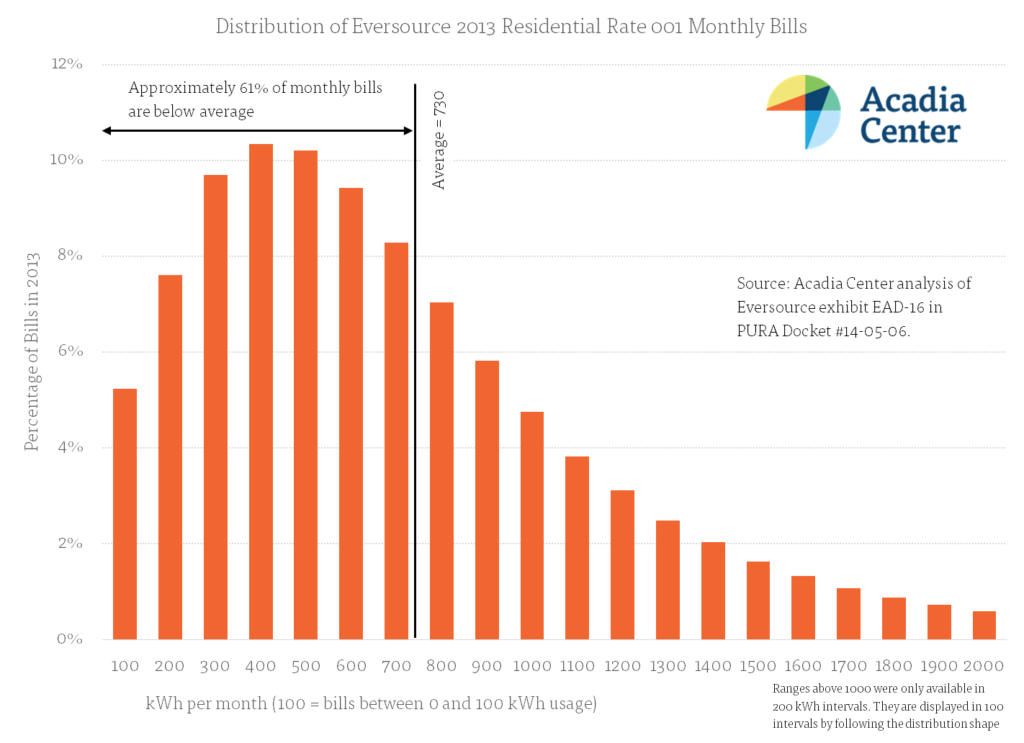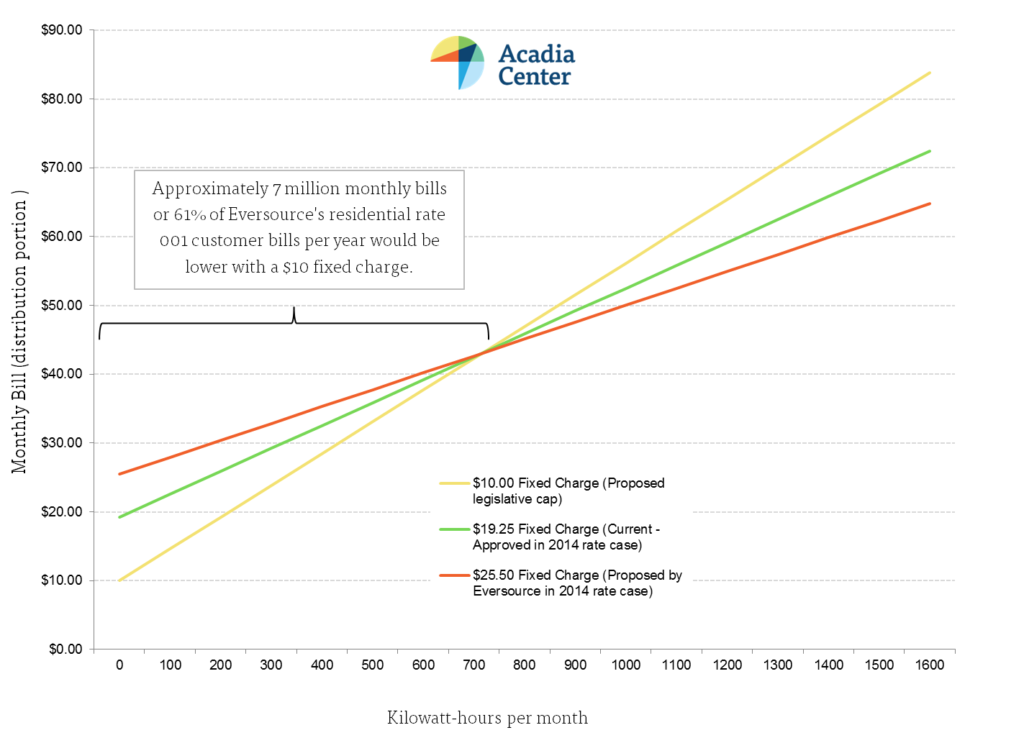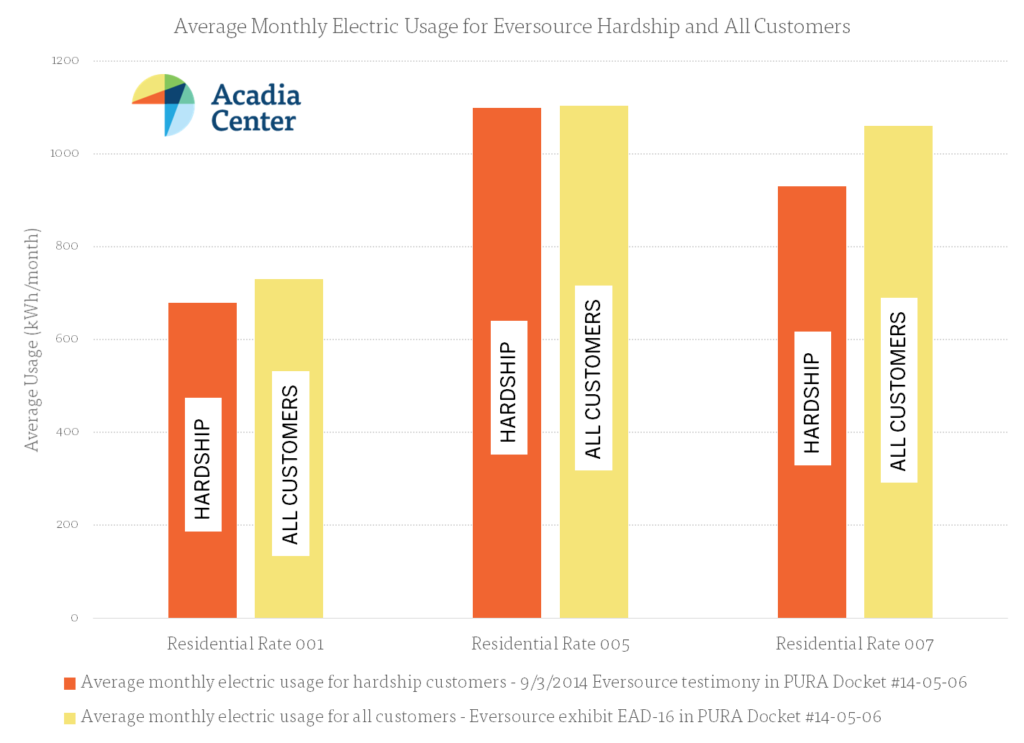New Analysis Shows that Capping the Fixed Electric Charge at $10 Will Lower the Majority of Monthly Bills for Eversource Energy’s Residential Customers
Hartford, CT – Rebutting inaccurate information publicly provided by Eversource Energy in response to efforts to place a ceiling on fixed minimum customer charges, new analysis released today by Acadia Center shows that significantly more than half of residential customers’ monthly bills would decrease if the General Assembly enacts a $10 fixed charge cap, as proposed in pending Senate Bill 570.
Using information provided by Eversource in its 2014 rate case before the Public Utility Regulatory Authority (PURA), Acadia Center found that:
- All residential customers that use less electricity than the average in a given month would pay less if the fixed charge decreases from $19.25, the existing amount, to $10, the maximum allowed under S.B. 570’s proposed cap;
- 61% of monthly bills in Eversource’s primary residential rate class fall below the average of 730 kilowatt hours per month; and,
- Increasing the residential fixed charge to $25.50 per month—the amount sought by Eversource in its rate case—would increase monthly bills for all customers that use less electricity than the average.
“Policymakers deserve to have sound facts and transparent analysis put before them on the critical issue of high fixed charges,” said Daniel L. Sosland, Acadia Center President. “An overwhelming majority of Eversource’s approximately 1 million residential customers will pay higher bills and have their incentive to use energy efficiently thwarted under Eversource’s high fixed charge rate approach. Claims by Eversource that consumers do not stand to benefit from lower fixed monthly charges conflict with reality.”
In an email sent to state legislators on May 12, 2015, an Eversource lobbyist claimed that, “more than half of our customers would see an increase in their overall bill if the fixed charge is lowered,” and that, “a $10 fixed charge is actually more regressive than a $19.25 fixed charge.” Eversource did not disclose the data or analysis supporting these billing impact claims, instead only releasing selective information on four residential customers with monthly energy consumption ranging from slightly above average to extremely high.
The residential billing information that Eversource submitted in its 2014 rate case does not support these claims. Acadia Center analyzed billing frequency data submitted as an exhibit by an Eversource rate design expert and determined that a majority of residential monthly bills in the Rate 001 class—the primary residential customer class—fall below the average level of consumption.

The results are similar for the other two Eversource residential rate classes: 58% of monthly bills in Rate 005, a closed electric heating class, fall below the 1103 kWh average and 64% of monthly bills in Rate 007, a very small time-of-use class, fall below the 1060 kWh average.
Acadia Center then analyzed three fixed charge scenarios to reveal the monthly billing impact on Eversource’s residential customers. The three scenarios were: (1) leaving the fixed charge at its current amount of $19.25 per month; (2) reducing it to $10 per month, which would be the maximum allowed under S.B. 570; and (3) increasing it to $25.50 per month, the amount sought by Eversource in its 2014 rate case. The results prove that high fixed charges are more regressive than low fixed charges, as the billing impact on low-use customers increases as the fixed charge increases.

“The math is undeniable,” said William E. Dornbos, Acadia Center CT Director and Senior Attorney. “More residential bills will go down if the General Assembly acts to cap these excessive and ever-increasing fixed charges. We need to end our overreliance on this regressive way to price electricity, and so we urge the General Assembly to pass Senate Bill 570 this session.”
In a handout distributed to legislators earlier this month, Eversource also claimed that low-income hardship customers had average electricity usage between 750 and 1100 kilowatt hours per month, implying that any decrease in the fixed charge would burden them disproportionately.
“In reviewing the transcripts from Eversource’s rate case, we noticed that their testimony on this point is in direct conflict with the handout’s claim,” said Jamie Howland, Acadia Center’s Director of Climate and Energy Analysis. “An Eversource rate design witness testified that average hardship customers actually used less than the overall average for each residential class.”

Acadia Center also researched publicly-available data on the relationship between income level and electricity use and found that there is a strong correlation between the two factors, as shown in the following chart.

“What this correlation means is that low-income households in Connecticut will, on the whole, benefit from any reduction in the fixed charge,” said Howland. “It’s always possible to pick outlier examples when analyzing rate design scenarios, but the best way to evaluate billing impacts is by customer class, not through selective customer anecdotes.”
“We believe that the facts demonstrate that capping the fixed charge in Connecticut at $10 will benefit a majority of customers and support public policy goals,” said Sosland. “It is important that policy decisions be made based on accurate information. Our goal with this analysis is to contribute to an open and honest debate about this issue.”
[Above referenced Eversource 2014 rate case testimony can be found here]
Background on the Fixed Charge in Connecticut
A fixed charge is a monthly flat minimum charge on a customer’s electricity account, sometimes called a customer service charge. The fixed charge should be an accurate calculation of the minimum, short-term fixed cost of connecting a customer to the grid. These costs should be limited to the cost of the customer’s meter, service drop, and metering and billing.
Most major utilities in New England (outside of Connecticut) have residential fixed charges in the $5-10 range. Notably, the three Massachusetts operating units of NSTAR Electric (now part of Eversource) have residential fixed charges of $6.43, $6.87, and $3.73 per month. Western Massachusetts Electric Co., also part of Eversource, charges $6 per month. The region’s other major multi-state utility, National Grid, has residential fixed charges of $4 and $5 in Massachusetts and Rhode Island, respectively.
The residential fixed charges of Eversource Energy (formerly Northeast Utilities and its local subsidiary, Connecticut Light & Power) and United Illuminating are, respectively, the highest and the second highest in New England for any major electric utility. Eversource’s is now $19.25 per month, a twenty percent increase over the previous amount. UI’s is now $17.25 per month. Eversource’s residential fixed charge was last in the reasonable range in 2007, when it was $9.99 per month. Since 2004, both utilities have increased their residential fixed charges at a pace more than four times faster than the cumulative rate of inflation for that same time period.
Both utilities can be expected to seek additional increases in their next rate cases (possibly 2016 or 2017). In its 2014 rate case, Eversource proposed a residential fixed charge of $25.50, while asserting that its analysis showed it was actually entitled to a $34.96 charge.
Contact
William Dornbos, Senior Attorney and Director, Connecticut Office, 860-246-7121 x202, wdornbos@acadiacenter.org
Emily Avery-Miller, Director External Relations, Acadia Center, 617-742-0054 x100, eavery-miller@acadiacenter.org
Download here:
052015_AcadiaCenter_PressRelease_CTFixedChargeScenarios_Final


















